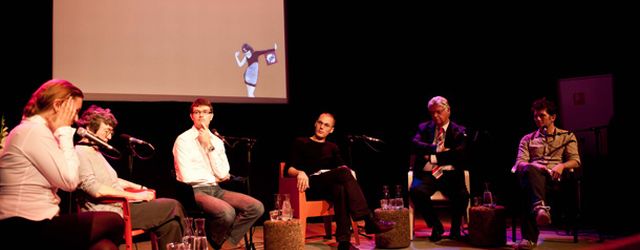![]() Het debatseizoen in Rotterdam is dit jaar geopend in de vernieuwde zaal van De Unie. De net opgeleverde ruimte doet prettig en intiem aan. Des te opmerkelijker de uitspraak van gespreksleider Natasja van den Berg dat vragen vanuit de zaal niet zijn toegestaan ‘omdat die toch nergens over gaan’. Dat klinkt niet echt als warm welkom in een debatcentrum. Weliswaar leverde het podiumgesprek onder haar strakke leiding een verrassende meerwaarde. De uiterst diverse sprekers vonden elkaar in een prikkelende conclusie: de hedendaagse kunstenaar als participerend socioloog. Maar vooralsnog sloot het debat zelf publieksparticipatie uit.
Het debatseizoen in Rotterdam is dit jaar geopend in de vernieuwde zaal van De Unie. De net opgeleverde ruimte doet prettig en intiem aan. Des te opmerkelijker de uitspraak van gespreksleider Natasja van den Berg dat vragen vanuit de zaal niet zijn toegestaan ‘omdat die toch nergens over gaan’. Dat klinkt niet echt als warm welkom in een debatcentrum. Weliswaar leverde het podiumgesprek onder haar strakke leiding een verrassende meerwaarde. De uiterst diverse sprekers vonden elkaar in een prikkelende conclusie: de hedendaagse kunstenaar als participerend socioloog. Maar vooralsnog sloot het debat zelf publieksparticipatie uit.
Helemaal uit de lucht vallen kwam het verbod van van den Berg niet. Traditioneel begint het debatseizoen van de Unie altijd met het Keuzedebat dat plaats vindt op het podium van de Grote Zaal van de Rotterdamse Schouwburg. Vanwege de fysieke scheiding tussen podium en publiek is dit meer een ‘talk show’ waarin vragen lastig zijn. Maar in de intieme setting van de Unie komt het verbod wat arrogant over.
Het debat zelf maakte overigens een frisse indruk. Naast Van den Berg (1975) was er een jonge garde bestaande uit de kunstenaars Jorge Leon en Jonas Staal en de socioloog Willem Schinkel. Als evenwicht waren er de meer ervaren dramaturg Marianne Van Kerkhoven en politicus Ruud Vreeman.
Vooral Van Kerkhove blijkt een bijzondere mix van bevlogendheid en levenswijsheid. Van haar hand is de indrukwekkende installatiereeks ‘K, a Society’. Deze reeks toont volgens haar zeggen mensen zoals ze te zien zouden zijn in een ‘eindbeeld van de wereld’.
De jonge filmmaker Jorge Leon is een avonturier. Hij werkt met kunstenaars samen op de grens van beeldende kunst, dans en theater. Het drieluik ‘To Serve’ is van zijn hand. Luciditeit of helderheid van geest vindt hij het belangrijkste aspect van kunst. De vorm doet er verder niet meer toe.
Jonas Staal (1981), de Rotterdamse ‘agitator’, propageert ‘een hernieuwd streven naar kunst voor iedereen waarin jonge kunstenaars en progressieve politiek weer een gemeeschappelijk project moet formuleren’.
Ruud Vreeman (1947) concludeert dat de politiek zou moeten leren van ‘identificatie- en verwonderingsmogelijkheden’van de kunst. Hierdoor zouden populisme en vernieuwingspolitiek samen gedacht kunnen worden.
Het is uiteindelijk Willem Schinkel (1976) die de aanzet geeft tot de lucide conclusie van kunstenaar als participerend socioloog waar de sprekers zich uiteindelijk bij thuis voelen. Kernvraag in de hedendaagse kunst is volgens hem de vraag naar ‘de relatie van de kunstenaar met zijn sociale omgeving. Hiermee zijn mondiale ongelijkheid, uitbuiting en onderdrukking kunstthema’s geworden’. Zo wordt de kunstenaar een participerend onderzoeker, maar moet zich tegelijkertijd goed realiseren dat zijn resultaat herkenbaar is al kunst, ‘ander verliest hij de mogelijkheid om zijn resultaat te verkopen’.
Jammer dat de echte luisteraars in de zaal niets mochten vragen over de door Van Kerkhove aangestipte paradigmawisseling in de kunst, of het onbegrip van Staal voor de verzoenende positie van Vreeman. Of over Schinkels verhaal over de werkelijkheid als verzameling geïsoleerde sferen dat zelf absolute waarheid claimt zonder dat er een overstijgende waarheid kan bestaan. Nu liepen de sprekers dan ook wat beduusd van het podium, ongewis over wat de zaal er eigenlijk van vond.
‘Het Internationale Keuze Debat’ door De Unie in Debat en de Rotterdamse Schouwburg. Bijgewoond: donderdag 23 september in De Unie.
foto: Rene Castelijn


Reacties zijn gesloten.